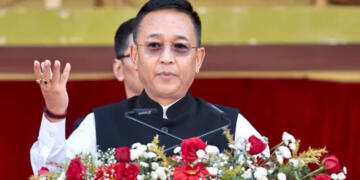
Our constitution was written with the highest possible ideals. It provides for equality of citizens before law. It guarantees them liberty, justice and dignity. In theory, these are wondrous words whose magical powers should surely make a nation great. Unfortunately, however, the constitution fell into hands of men, who unlike the great men and women who had framed the constitution, were small in stature and intellectually petty. The words of the constitution were then freely interpreted so as to sound the same but to mean the opposite- a case of adhering to the letter but tossing out the spirit. And thus, the modern Indian Republic finds itself grappling with what is called Pseudo Secularism. Interestingly, the original constitution did not include the word Secularism, (although it can be argued that it was implied as the constitution guaranteed citizens liberty and equality before law), the term was added by Mrs. Gandhi in 1976, during the heydays of Emergency.
Some of these petty politicians discovered that the Hindu majority of the country was divided into castes, language groups etc., making it difficult to organize them as one massive voting block. The minorities, on the other hand were easier to organize. In the aftermath of the partition, some of these minorities felt vulnerable in a Hindu-majority state. In a parliamentary democracy, strength is in numbers and hence some of the more astute politicians, exploited the fears of minorities to first guide them into a common block and eventually win seats. Over a period of time, politicians of all hues and colours realized the importance of vote banks. Caste, creed, religion, language, race etc.- all eventually served as vote banks. These vote banks are used to primarily exploit the fear that the group has of the invisible other- minorities of being subsumed in a Hindu monolithic whole, castes of being dominated by stronger castes as was the case in the past, linguistic groups of losing their unique identity etc.
The politics of vote banks might have begun in the 60s and the 70s but came to the fore in the turbulent 80s. Three stark cases that put a question mark on the policy of the state are recorded below-
1. Shah Bano Case
In 1978, after 46 years of marriage, Shah Bano’s husband, Mohd. Ahmed Khan, a lawyer in Indore, divorced her. For 32 of these 46 years, Ahmed had kept 2 wives. Overnight, the 62 year old Shah Bano and her 5 children found themselves destitute. Her now ex-husband offered her a measly Rs. 5400 as maintenance as prescribed by Sharia law. Shah Bano ran from court to court, pleading her case and demanding monthly maintenance. In 1985, the Supreme Court unanimously upheld a previous decision of the High Court and ordered Ahmed to offer monthly maintenance to Shah Bano. The Muslim orthodoxy seethed with anger at what they saw was the Court’s attempt to dilute the provisions of Muslim Personal Law. Sensing an opportunity to get hold of the Muslim votes, Rajiv Gandhi’s Congress sided with the Muslim orthodoxy and passed a bill in the Parliament to undo Supreme Court’s orders. All of Shah Bano’s travails came to nothing. Politics in the garb of orthodoxy had triumphed over reason. Not for the first time, would the interests of the State and Society be sacrificed at the altar of Electoral politics- Pseudo secularism triumphed!
2. Khalistan Movement
The politics of Punjab, after the creation of Punjabi Suba were dominated by Akali politics. Although Congress won electoral victories, the Akalis continued to grow strong. The shrewd politician that Indira Gandhi was, she propped up Bhindrawale as a tool to wreck Akali power. The emergence of Bhindrawale caused a great disarray in the Akali camp and Indira continued to use him to meet her political objectives. It was only later, when she realized that Bhindrawale was a double edged sword that she sent the army to crush him. But by then it was too late. Punjab would suffer for more than a decade, paying the price for Indira’s follies. And upon Indira’s assassination, Congressi Secularists left no stone unturned to avenge her death by Sikh extremists. Sikhs were hunted down and slaughtered in the national capital. Once again, lip service was paid to the ideal of Secularism and extremists were freely deployed to meet electoral objectives- Pseudo Secularism triumphed again!
3. Ram Janmabhoomi Andolan
The demolition of the disputed structure is seen by Secularist-liberals as a big setback to the evolution of secularism in India. They show it as an example of what India would become if majority communalism were to be allowed to thrive. They conveniently choose to overlook the fact that as on today, there is no doubt that an ancient structure was demolished to construct the mosque in 16th century. They choose to deny that Ayodhya and Ram are an integral part of the Hindu identity. For them, the history of the structure, begins with Babri Masjid and ends at its demolition. All they do is harp on the fact that a Ram Mandir on the disputed site will not help further India’s secular credentials and that majority communalism will reduce the country to cinders. Minority passions are whipped up and electoral dividends collected. Once again, logic, reason and sanity have had to make space for blatant minorityism -Pseudo Secularism triumphs still!






























Brilliant, clear explanation… Destruction by Congress…
all of these problems are well known. we need to find the solution. since the so called secular and liberal have accepted the violence perpetrated by muslims as their human right, it is only normal for hindus to follow the same path. what do you guys think. it is time we hindus rise and learn to fight back
Only time riots are called ‘communal riots’ and have camera covering them is when Hindu’s have fought back. Meerut used to see riots every years till mid 90’s and then just one year Hindus fought back and no riots happened after that. Sam things happened in Ahmedabad.
Not supporting communal riots though but the fact that media is biased and shows only one side of the coin.
Bhaiyya kahey logan key brainwa mein zehar gholat ho. Jab desh mien 80% hindu hain, army 100% hindu hai police 100% hindu hai.. wakeel log hindu, judge hindu, public hindu, prosecuter hindu, phir kahey nahi parliament mein kanoon paas karath ho key mandir huein bani.. aur ee bhi kanoon banwaao key kauno musalmaan eeeka apeal na karsakey aur jo kauno secular ekay khilaf boley uka jail mein daalo.. sasura shanti miley.. iss roj roj key mandir key diramey sey
Are bhai aapka dimagwa kharaab hai kaa
Kon kaha aapko ki police aur army puri hindu hai?? Aur judge aur wakil bhi
waseem barelvi sahi keh raha hai,
asli problem musalmaan nahi hai, asli problem vo hindu hai jo sirf naam k hindu hai.
kya Rajiv Gandhi Hindu nahi tha? kya ye saare pseudo-secular hindu nahi hai? kya ye Nehru Hindu nahi tha?
asli problem ye hai ki ye saare naam k Hindu kabhi veda aur upanishad nahi padhe, na yoga darshan padhe, na sankhya darshan. unhe na bharat ki vichaardhaara pata hai na vo us vichaardhaara ko jeete hai.
inhe na dharma ka gyaan hai na moksha ka. aur inke karm bhi isi agyaan se prerit hai.
yahi haal zyadatra hinduon ka hai.
samasyaa ka samaadhan ye hai ki ham pracheen bharat ki shiksha vyavastha ko punah sthapit karna hoga. (baba ramdev isi kaam me lage hue hai)
musalmaanon ko bura-bhala kehne se kuch nahi hoga.
It is factually incorrect that security forces and other professionals are 100% Hindus. It is true that Muslims have lower representation in all these professions but then, the question arises, why is that? Muslims haven’t been an oppressed class like Dalits. They ruled a large part of this subcontinent for several centuries. Why are they still behind? They let themselves get used by the “secular” political parties and get nothing in return, they avoid modern education and later turn out unfit for the current job market, they let the unscrupulous elements take advantage of their unfounded insecurity with respect to the majority community. Get up from your sleep. Don’t let yourself be considered simply as a vote bank instead of people. Understand the current economy and be part of such education system which provides you with jobs, try saying no to religious laws when it is necessary and have faith in the Hindu community as well.
Abe Ghonchu, kabhi madrasse aur apne ghetto se bahar niklo to dekho India mein hakeem se le ke senior doctors tak, auto driver se le ke Airline Pilot tak, Majdoor se le ke Engineer tak, chapraasi se le ke senior bureaucrats tak, hawaldar se le ke senior police officers tak.. Muslims har jagah hain.
Hindustan baut bada hai…tumhaare ghetto muhalle se bahut bada.
I agree with first two points but not the last one. Ram Janmbhoomi andolan and demolition of Mosque was also politically motivated. Unlike other developed or developing countries, the lack of Uniform Civil Law is major hindrance of secularism. A famous example is Darmendra (Actor) who converted to muslim just to marry his second wife. Either allow polygamy for all or completely abolish it for all. All the donations collected by temple goes to government which decides how it will be spent. This is not the case with other religions.
Politician try to keep muslims, sikhs and other minorities as poor and illiterate for sole purpose of their vote bank. Many muslims that I have talked to want to be treated as equals not as aliens.
Money facor is important. Let all temple visitors resolve not to offer cash to the temples. They should offer just flowers and may be a token sum of one rupee. Deities don’t demand even that sum! Should you want to do charity you may identify the poor and needy around you and help them.
This will solve the problem of the Government misusing your funds.
I see your point, but there will still be problem with your solution. How do you identify real poor? Many mafias force poor to become beggars and then they take away whatever money they get. It will be wrong to say that all NGOs are bad and everyone in Government is corrupt.
The point I was making is that people think they are giving money to the temple but in actuality they are not. All the donation collected by temples goes to Government and then the government decides how to use it. Temple officials have NO say in it. Government can use the money for development or repairing of the temple or they can use for any other purpose. Temples also do lot of social work like feeding poor during bhandara.